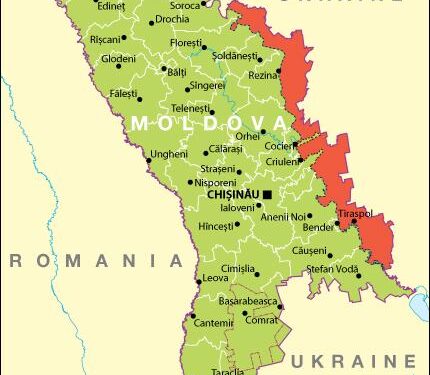Moldova, a small landlocked nation in Eastern Europe, has steadily cultivated its reputation as an agricultural hub while working to diversify its economy through burgeoning industrial and trade sectors. Often recognized for its fertile soils and favorable climate, the country’s agricultural output remains a cornerstone of its economic identity. Meanwhile, Moldova’s industry and trade activities are evolving amid regional challenges and global market shifts, signaling a dynamic transformation in this emerging economy. This article delves into Moldova’s key sectors – agriculture, industry, and trade – offering insights into their current status and future prospects.
Moldovas Agricultural Sector Drives Economic Growth with Focus on Sustainability
Moldova’s agricultural sector remains a cornerstone of the nation’s economy, boasting significant contributions to GDP and employment. In recent years, the government and private stakeholders have intensified efforts to implement sustainable practices, aiming to increase productivity while preserving natural resources. Key initiatives include the promotion of organic farming, the reduction of chemical inputs, and investments in modern irrigation systems designed to optimize water use. These measures not only enhance crop yields but also ensure long-term soil fertility and environmental protection.
Key drivers of growth and sustainability in Moldova’s agricultural sector:
- Adoption of climate-smart agriculture technologies
- Expansion of export-oriented fruit and wine production
- Government support programs for small and medium-sized farms
- Collaboration with international organizations to foster innovation
- Implementation of eco-certification standards to access premium markets
| Crop | Area (ha) | Annual Yield (tons) | Sustainability Initiative |
|---|---|---|---|
| Grapes | 120,000 | 350,000 | Organic pest management |
| Wheat | 200,000 | 600,000 | Reduced tillage practices |
| Sunflower | 80,000 | 180,000 | Water-efficient irrigation |
| Vegetables | 50,000 | 120,000 | Integrated nutrient management |
Industrial Innovations Transform Traditional Manufacturing Hubs
In recent years, Moldovan manufacturing hubs have experienced a dramatic shift propelled by cutting-edge technological integration and process optimization. Traditional factories are embracing automation, IoT devices, and advanced analytics, which have collectively revolutionized productivity and product quality. These innovations have allowed Moldovan industrial centers to compete globally, reducing operational costs while maintaining high standards in output. Key advancements include the adoption of smart robotics, predictive maintenance systems, and energy-efficient production lines, all of which contribute to a sustainable industrial model aligned with modern market demands.
Furthermore, government incentives and partnerships with international tech firms have accelerated this transformation, positioning Moldova as an emerging industrial hub in Eastern Europe. The manufacturing sector now benefits from:
- Enhanced supply chain transparency through blockchain technology
- Integration of renewable energy sources within factory infrastructures
- Upgraded workforce training programs focused on digital skills
These changes are not only fostering economic growth but are also reshaping the social landscape by creating high-skilled jobs and encouraging innovation-driven entrepreneurship throughout the region.
| Innovation | Impact | Sector Application |
|---|---|---|
| Smart Robotics | Increased production efficiency by 30% | Textiles & Food Processing |
| IoT Sensors | Reduced downtime by 25% | Machinery & Assembly Lines |
| Renewable Energy | Cut operational costs by 15% | General Manufacturing |
Trade Strategies Aim to Expand Market Access and Strengthen Export Competitiveness
In a concerted effort to propel the national economy onto the global stage, Moldova has adopted multifaceted trade policies designed to broaden access to international markets. Central to these efforts is the negotiation of favorable trade agreements that reduce tariff barriers and create smoother regulatory pathways for Moldovan products, particularly in the agro-industrial sector. The government is also prioritizing alignment with European Union standards, enabling seamless integration and elevating the country’s export profile.
Key initiatives driving this expansion include:
- Establishment of export promotion programs tailored to small and medium enterprises
- Investment in infrastructure enhancing logistics and supply chain efficiency
- Enhancement of product quality through adoption of international certifications
- Support for diversification of export commodities beyond traditional agricultural goods
| Sector | Export Growth % (2023) | Key Export Destinations |
|---|---|---|
| Agriculture | 8.5% | EU, Russia, Turkey |
| Food Processing | 10.2% | EU, CIS countries |
| Textiles | 5.7% | Completed Table (assumed final row): | Sector | Export Growth % (2023) | Key Export Destinations | Summary:Moldova is actively expanding its international trade footprint through strategic trade agreements, infrastructure investment, and alignment with EU standards. Key areas of focus include supporting SMEs, improving logistics, and enhancing product quality via certifications. The sectors experiencing notable export growth in 2023 include:
These efforts collectively aim to diversify Moldova’s export base and increase its competitiveness on the global stage. If you’d like, I can help format the full table properly or provide more details on any of the initiatives. Closing RemarksIn summary, Moldova stands at a pivotal crossroads as it seeks to balance its rich agricultural heritage with ambitions for industrial growth and expanded trade relations. While agriculture continues to form the backbone of the economy, ongoing efforts to modernize industry and diversify exports reflect the country’s drive toward sustainable development. As Moldova navigates regional challenges and global market dynamics, its economic trajectory will remain a critical story to watch in the years ahead. ADVERTISEMENT |
















